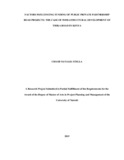| dc.description.abstract | For the last few decades, maintenance and development of any infrastructure is being
recognized as catalyst of sustainable economic growth and investment opportunity.
Development of infrastructure projects through Public Private Partnership (PPP) route has
become one of the commonly adopted procurement strategies in most countries. The
proposed study therefore intends to investigate factors influencing funding of public private
partnership road projects in Kenya with special focus to infrastructural development of
Thika Road. The study was guided by the following specific objectives how budget deficits,
procurement procedure, project financial feasibility and project schedule influence funding
of public-private partnership road projects. The study population for the study was the staff
working at the Public Private Partnership. The study adopted descriptive research design.
This study employed census sampling techniques due to the small number of respondents.
The study relied mostly on primary data sources where self-administered questionnaire were
adopted as source of data. The quantitative data was coded and entered into Statistical
Packages for Social Scientists (SPSS Version 21.0). The study also conducted inferential
statistics that involved coefficient correlation, coefficient of determination and multiple
regression. Pearson Correlation Coefficient showed that there was a positive relationship that
there was a positive correlation between funding PPP road projects and budget deficits as
shown by a correlation value of 0.521. Findings revealed that it was also clear that there was
a positive correlation between funding PPP road projects and procurement procedure with a
correlation value of 0.618, there was also a positive correlation between funding PPP road
projects and project financial feasibility with a correlation value of 0.587 and a positive
correlation between funding PPP road projects and project schedules with a correlation
value of 0.553. This shows that there was a positive correlation between funding PPP road
projects and budget deficits, procurement procedure, project financial feasibility and project
schedules. Findings from this study reveal that the fundamental justification for adopting
PPP would significantly reduce the upfront costs for the government in providing and
maintaining public facilities and that it allows for improvement in the public facilities and
services because PPP encourages innovation by the private sector. The study concludes that
the involvement of the private sector in the development and financing of public facilities
and services has increased substantially over the past decade and Government borrowing is
much less significant than at first thought and that PPP is now seen as essentially a new
approach to risk allocation in public infrastructure projects. Based on the finding, the study
recommends that for PPP to be successful projects should be attractive to the private sector,
that is to have a strong business case or satisfy key commercial terms. Feasibility analysis
should be conducted to establish whether the project makes sense at all and if it has the
potential to be implemented as a PPP. The PPP policy emphasizes feasibility of a project as
a condition precedent in delivering a successful project and states that a good and
comprehensive feasibility study has to be undertaken to assess, among other criteria;
affordability of project to both Government and the general public | en_US |

